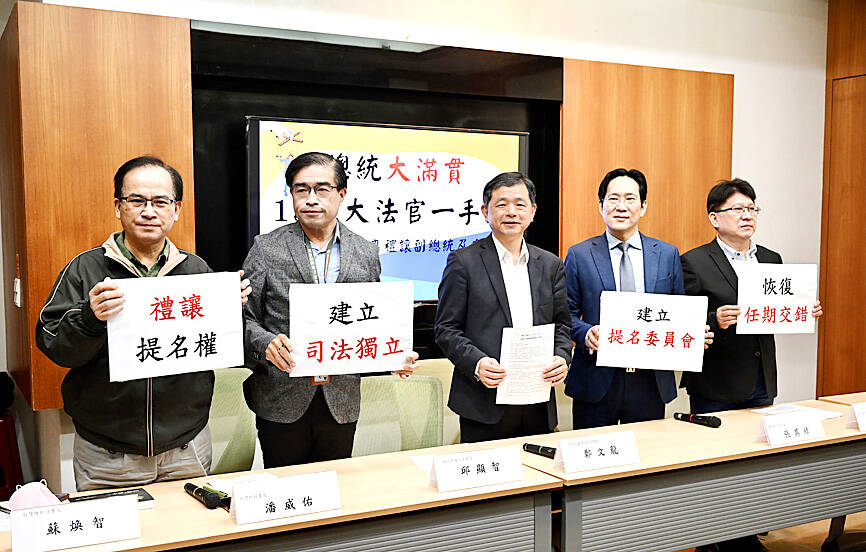A judicial reform group has called for constitutional amendments regarding the appointment of grand justices, citing concerns that the current system has enabled presidents to appoint all 15 members of the Constitutional Court.
The call came after the Presidential Office on March 7 established a committee to select candidates to replace four grand justices who are to retire on Sept. 30, after serving terms started on Oct. 1, 2015.
This means the Constitutional Court would be comprised entirely of justices picked by President Tsai Ing-wen (蔡英文), pending their approval by the legislature, Taiwan Jury Association founder Jerry Cheng (鄭文龍) told a news conference on March 9.

Photo: Lo Pei-de, Taipei Times
The grand justices are tasked with protecting the constitutional democratic order by issuing constitutional interpretations, preside over cases with great political implications and, if necessary, impeach the president, he said.
Constitutional amendments adopted in 2008 stipulate that the grand justices serve a single eight-year term, Cheng said, adding that they are appointed in two cohorts four years apart, a design intended to prevent the president from wielding too much influence over the court.
However, the system has been in disarray since former president Ma Ying-jeou (馬英九) disregarded the cohort mechanism and filled seven vacancies, he said.
Articles of the Constitution governing the terms of grand justices should be rewritten to explicitly protect the cohort mechanism and create an alternative system in which not only the president is allowed to nominate candidates, Cheng said.
The mechanism should involve a committee comprised of lawmakers, judges, other officials and representatives of political parties, Cheng said, adding that it could also be governed by an independent agency.
Tsai should allow the vice president, the Legislative Yuan speaker, opposition parties and an independent body to select one candidate each, Cheng said, adding that this would ensure that diverse opinions are represented in the court.
Taiwan People’s Party Legislator Jang Chyi-lu (張其祿) said that by disrupting the terms of grand justices, the Constitutional Court might itself breach the Constitution, urging Tsai to address the issue.
Tsai has a historic opportunity to solve the issue, Jang said, backing Cheng’s proposal.
In related news, Vice President William Lai (賴清德), who has been tapped by Tsai to convene the selection committee, has resigned from it, effective immediately, the Presidential Office said on Friday.
Presidential Office spokeswoman Lin Yu-chan (林聿禪) said Lai’s resignation was a result of his decision to enter the Democratic Progressive Party’s presidential primaries.
As his bid to run for the party in next year’s presidential election is considered an internal political activity, Lai resigned to prevent any political disruptions from corrupting an impartial judicial selection process, Lin said.
Additional reporting by CNA

A preclearance service to facilitate entry for people traveling to select airports in Japan would be available from Thursday next week to Feb. 25 at Taiwan Taoyuan International Airport, Taoyuan International Airport Corp (TIAC) said on Tuesday. The service was first made available to Taiwanese travelers throughout the winter vacation of 2024 and during the Lunar New Year holiday. In addition to flights to the Japanese cities of Hakodate, Asahikawa, Akita, Sendai, Niigata, Okayama, Takamatsu, Kumamoto and Kagoshima, the service would be available to travelers to Kobe and Oita. The service can be accessed by passengers of 15 flight routes operated by

GIVE AND TAKE: Blood demand continues to rise each year, while fewer young donors are available due to the nation’s falling birthrate, a doctor said Blood donors can redeem points earned from donations to obtain limited edition Formosan black bear travel mugs, the Kaohsiung Blood Center said yesterday, as it announced a goal of stocking 20,000 units of blood prior to the Lunar New Year. The last month of the lunar year is National Blood Donation Month, when local centers seek to stockpile blood for use during the Lunar New Year holiday. The blood demand in southern Taiwan — including Tainan and Kaohsiung, as well as Chiayi, Pingtung, Penghu and Taitung counties — is about 2,000 units per day, the center said. The donation campaign aims to boost

ENHANCING EFFICIENCY: The apron can accommodate 16 airplanes overnight at Taoyuan airport while work on the third runway continues, the transport minister said A new temporary overnight parking apron at Taiwan Taoyuan International Airport is to start operating on Friday next week to boost operational efficiency while the third runway is being constructed, the Ministry of Transportation and Communications said yesterday. The apron — one of the crucial projects in the construction of the third runway — can accommodate 16 aircraft overnight at the nation’s largest international airport, Minister of Transportation and Communications Chen Shih-kai (陳世凱) told reporters while inspecting the new facility yesterday morning. Aside from providing the airport operator with greater flexibility in aircraft parking during the third runway construction,

American climber Alex Honnold is to attempt a free climb of Taipei 101 today at 9am, with traffic closures around the skyscraper. To accommodate the climb attempt and filming, the Taipei Department of Transportation said traffic controls would be enforced around the Taipei 101 area. If weather conditions delay the climb, the restrictions would be pushed back to tomorrow. Traffic controls would be in place today from 7am to 11am around the Taipei 101 area, the department said. Songzhi Road would be fully closed in both directions between Songlian Road and Xinyi Road Sec 5, it said, adding that bidirectional traffic controls would